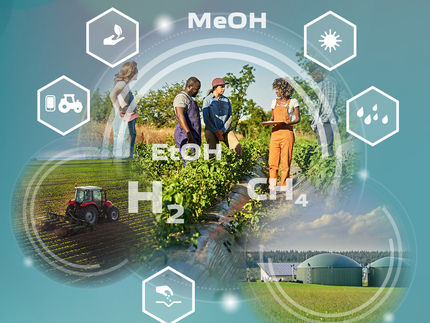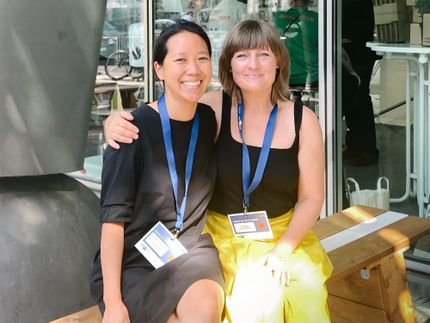Promoting impact investment in Sustainable Chemistry innovations
Indian Start-up wins ISC3 Innovation Challenge
Advertisement
What does it take to establish and maintain sustainability as a measurable value for companies? What conditions need to be created for ideas in sustainable chemistry to flourish? And which start-ups worldwide promise the greatest impact in this field with their innovations? These and other central questions about innovations for Sustainable Chemistry were answered at the Investor Forum 2023 of the International Sustainable Chemistry Collaborative Centre (ISC3). The fifth edition took place live as part of the 5th World Chemicals Conference ICCM5 in Bonn. International representatives from politics, industry, NGOs, science, environmental associations and investors met 18 international start-ups to talk about meaningful cooperation and to award the most innovative ideas and solutions in the field of Sustainable Chemistry at the finals of the ISC3 Innovation Challenge, which is endowed with a total of 25,000 euros.
The Innovation Challenge is an integral part of the Investor Forum. The 2023 Award on the topic of "Sustainable Chemistry and Agriculture" won Indian start-up Schutzen with bio-based, biodegradable textiles, paints and varnishes, body care products and household chemicals made from the seeds of the tamarind tree. In the "Special Impact" category, Makabi (Croatia) convinced the international jury with its development of 3in1 capsules to reduce agrochemicals in agriculture. Molepse Bioresources (Kenya) won the "Special Regional Impact" category with multitarget pesticides to protect stored grain and the Audience Award went to Natupla (Colombia) for developing bio-based, biodegradable materials and adhesives. The founder of the German start-up ClimEtSan-OnTheGround received an honourable mention from the jury as best female founder for her business idea and contribution to reducing greenhouse gas emissions. For the 2024 Innovation Challenge, ISC3 is looking for start-ups from around the world with the best ideas in the field of "Sustainable Chemistry and Textiles". "Sustainable solutions such as those presented here show the potential of innovations for combating environmental pollution," State Secretary Dr Christiane Rohleder noted in her speech at the official opening of the Investor Forum. Representing the BMUV, she spoke about the role of Sustainable Chemistry in international chemicals management, the BMUV's German sustainability agenda and the role of the ISC3. Finally, she addressed the start-ups presenting at the Investor Forum directly: "Your ideas inspire more innovations in the chemical sector that meet the requirements of Sustainable Chemistry."
"With the Investor Forum, ISC3 brings together selected international start-ups from the field of Sustainable Chemistry with investors every year. Financing is still one of the biggest challenges for the development of start-ups. Especially in the pre-seed and seed phase, many start-ups struggle to find an investor. As part of the ICCM5, we had a great political framework to bring the topic of innovation in Sustainable Chemistry as a central field of activity into the discussion on sustainable chemical management with concrete solutions. The finals of our annual Innovation Challenge and the award ceremony was again a highlight. Also this year, I was deeply impressed by the sustainable solutions presented by the start-ups, which motivates us at ISC3 to continue promoting them," says Dr Thomas Wanner, Managing Director of ISC3.
At the Investor Forum 2023 panel discussion, international experts spoke about the role of investors and governments in supporting start-ups, the importance of Sustainable Chemistry and the cooperation between business and science: “Not least because of the need for action, societal pressure and political commitments, I am convinced that in the next 30 years we will witness a sustainability revolution that will make sustainable investments the most profitable investments imaginable”, said Fabian-Domenic Meier (Groon IO, Germany). Marcelo E. Cobrol (Chief Scalability, Knowledge and Impact at IDB Labs, USA) concluded that the highest impact projects must also be profitable.
In his final statement, Melvin Kizito encouraged the start-ups: "Very often in the journey of building a new venture you will have to do something nobody has done before. Maybe it’s developing a new business model, or an engineering process. When you get to this point, you must be brave and take the step forward and trust in yourself that you will achieve what you believe in. If it's important you must do it even if the future is uncertain".
The second part of the Investor Forum was dedicated to the final pitches of the ISC3 Innovation Challenge Finalists and the Award Ceremony.
The winners of the Innovation Challenge 2023
In the pitch of the 8 finalists of the Innovation Challenge 2023, SCHUTZEN, won the first prize of 15,000 euros. The start-up from India produces bio-based and biodegradable textiles, paints and varnishes, personal care products and household chemicals. The company's goal is to replace fossil chemistry with C-12 isotopes and toxic groups with C-14 chemistry. SCHUTZEN mitigates climate change, reduces the toxicity of pollutants and ensures high biodegradability.
The Croatian start-up MAKABI was awarded €5000 as the winner in the "Special Impact" category. The start-up has developed a smart 3in1 capsule containing a formula of microparticles with a 3in1 effect for nutrition and protection of plant parts. They focus on the application of green encapsulation of bioactive components isolated from nature in agricultural products. This approach is expected to reduce the use of agrochemicals by 30% and reduce the negative impact on the environment. The start-up also offers collaboration in research and development for new products.
Molepse Bioresources won the prize in the category "Special Regional Impact" and received prize money of 5000 €. The Kenyan start-up produces and distributes novel multitarget pesticides to protect stored grain from weevil infestation. Its two products, Dudukit and Dudumit, comply with the 12 Green Chemistry Principles (GCP), are socially acceptable, contribute to economic growth and promote environmental stewardship. They are also more affordable than the products of commercial grain traders.
Other news from the department business & finance
Most read news
More news from our other portals
Something is happening in the chemical industry ...
This is what true pioneering spirit looks like: Plenty of innovative start-ups are bringing fresh ideas, lifeblood and entrepreneurial spirit to change tomorrow's world for the better. Immerse yourself in the world of these young companies and take the opportunity to get in touch with the founders.

























































